We’ve just about come to that point in January where, for many of us, the gust of novelty and promise of a new year is beginning to wear thin. We’re no longer writing and then having to scribble out ‘2023’ when marking down a date. 2024 is starting to settle in. All those ‘I’ll deal with it in the new year’ tasks are also coming back to roost. And, according to Norcross and Vangarello's findings, at the time of writing, between 34 and 40 percent of people reading this will have abandoned their resolution from the New Year.
Suffice it all to say: If you’ve found yourself at this point in January and your resolve is starting to shake, you are far from alone. If our goals for the year are starting to head south, how might we rejuvenate the motivation and energy to bring a resolution back to life?
Read More









